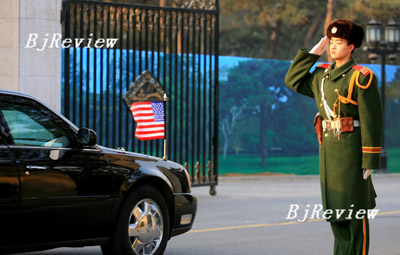
The security situation in the world will generally remain stable in 2007 although there will be turbulence in certain regions. It is set to grow more complex, however, as major factors affecting international security will continue to evolve, giving rise to new uncertainties.
Contending major powers
Featuring a combination of cooperation and competition, relations among major powers will become more complicated. The United States, which is beset with daunting issues such as antiterrorism, reconstruction of Iraq and Afghanistan and nuclear crises in North Korea and Iran, will not be able to get out of the strategic difficulties any time soon. The Bush administration was forced to reconsider and adjust its foreign policy after Democrats took control of both houses of the U.S. Congress in the November midterm elections.
Consequently, Washington may moderate its unilateral approach and switch to multilateral consultation. It is expected to demonstrate a stronger will to cooperate with other major powers to ease international tensions. Other major powers, for their part, will continue to improve their relations with the United States in a bid to safeguard world peace and secure their own interests. Against this backdrop, cooperation will dominate the relations among major powers in 2007. Their collaboration in antiterrorism, nonproliferation and global energy security is likely to deepen.
However, despite the pledge to amend its foreign policy, the Bush administration will not forsake the goal of maintaining U.S. hegemony in the world, a strategy that will plunge the country into structural conflicts with other major powers.
Actions it has taken in the "Greater Middle East," "Greater Central Asia," South Asia and Africa are evidence of U.S. intention to pursue geopolitical expansion. The U.S. National Security Strategy released in March 2006 indicated that while giving top priority to antiterrorism, it would check the emergence of countries "at strategic crossroads" such as China and Russia. Given these moves, other major powers are unlikely to discard their suspicion of the United States.
Conflicts may break out on issues concerning geopolitical strategies, regional dominance and their respective core interests. The United States conflicts with Russia not only in regions such as the Commonwealth of Independent States (CIS), Central Asia and South Caucasus, but also on issues including energy, democracy and human rights. It has disputes with Europe over policies toward antiterrorism and the Middle East. The United States and Japan also have strategic suspicions toward each other. These deep-rooted divergences will persist in 2007.
Regional hotspots
While unstable factors continue to haunt the international community, major crises might break out over some regional flashpoints.
In Northeast Asia, North Korea's underground nuclear test has triggered a negative response. Despite the recent resumption of the six-party talks involving North Korea, the United States, China, South Korea, Japan and Russia, the prospects of a nuclear-free North Korea are still elusive. Also, appeals to developing nuclear technology may become even louder in Japan in 2007, as it seeks to rewrite its pacifist Constitution. The possibility of a conflict between South Korea and Japan still looms, given the two countries' territorial disputes over Dokdo/Takeshima, which is claimed by both.
|
